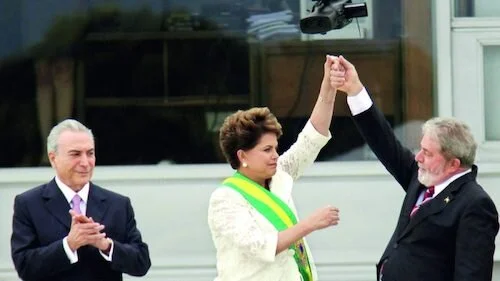The Edge of Democracy
Please excuse our lateness of this review! We are covering every Academy Award nominee of 2020, so we’re cleaning up the films we forgot to critique earlier.
As candid as The Edge of Democracy is to filmmaker Petra Costa, she maintains a neutral, emotionless voice throughout the entire documentary. The third film in a series of works that raise awareness of her family’s turmoils growing up in a politically severed Brazil (Undertow Eyes, a short film, and Elena, a docu-drama), The Edge of Democracy is as head-on of an approach on the struggles of her motherland as possible. This time, there is absolutely no holding back. Costa doesn’t. The film vows to smush as much information as possible within its two hour span, like a storyteller foaming at the mouth to fit every last word in. Costa knows the importance of getting all of this information out, likely because the world doesn’t quite know how screwy the economic crisis in Brazil was (outside of the questionable decision to host both a World Cup and the Olympics around the same time, which sparked an outrage).
Focusing on the rises-and-falls of Lula da Silva (or just Lula) and Dilma Rousseff (the 35th and 36th presidents of Brazil, respectively), The Edge of Democracy presents the illusions of choice and verbal freedoms. Both presidents, having been convicted of various forms of corruption (laundering, fiscal pedalling, and other wrongdoings), sent Brazil into a tailspin for the better part of the last fifteen years or so. Out of contained rage, Costa unleashes fact after fact, evidence after evidence, of the laundry list of things both presidents did, and how the country responded at each moment in time. Costa also reflects on her own personal family, and how this created a divide between loved ones, more than just their personal opinions. She tosses the word “democracy” around often, as if to wonder if this word contains any substance at all in a modern day Brazil (or in many countries, for that matter).
The rigid presidencies of Lula and Rousseff make up the entirety of The Edge of Democracy’s political analysis.
The film ends on the election of current president Jair Bolsonaro, and Costa wonders if history is only repeating itself once more. Blind faith after blind faith, Brazil’s joy of a hopeful future is constantly squandered. With one leader impeached (Rousseff) and the other still jailed (Lula), picking anyone has to be an improvement. That’s exactly Costa’s point, and why The Edge of Democracy is still important after these two failed presidencies. We can’t just assume that the next one will be better, because that’s how followers get into this predicament. With all of the damage done within the past twenty years, Petra Costa is rightfully apprehensive. A new face won’t stop deeply rooted corruption. A new name can’t promise the death of old ways. An oligarchy is often confused as a democracy, because of how terms are laid out. The edge of democracy is hardly a democracy at all, rather than being the implied sliver of it. Costa’s findings can teach a lot to all of us, whether we live in places like Brazil (or in Brazil), or countries that are beginning to exhibit signs of the same kinds of foul play.
Andreas Babiolakis has a Masters degree in Film and Photography Preservation and Collections Management from Ryerson University, as well as a Bachelors degree in Cinema Studies from York University. His favourite times of year are the Criterion Collection flash sales and the annual Toronto International Film Festival.





